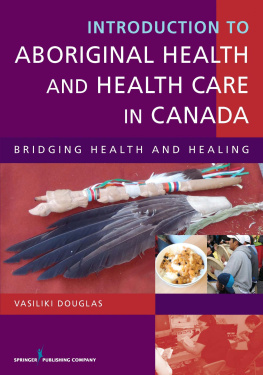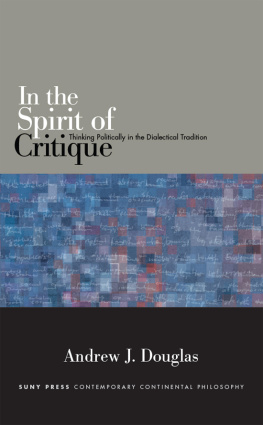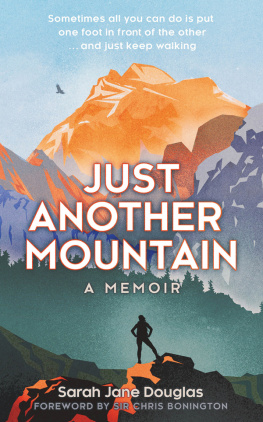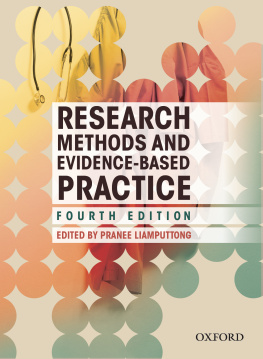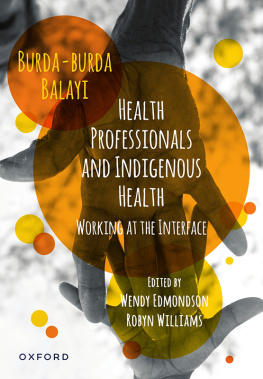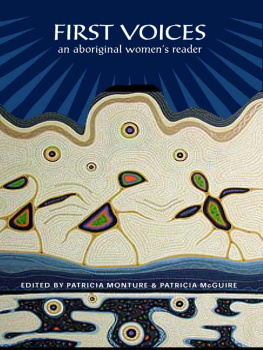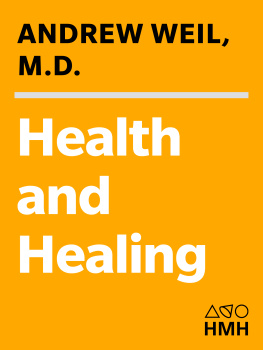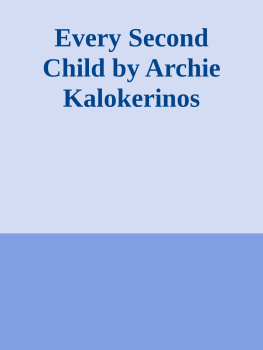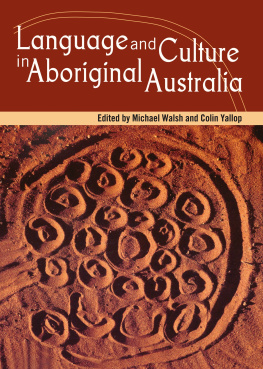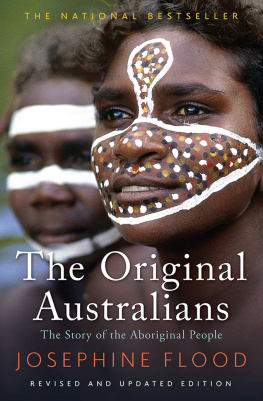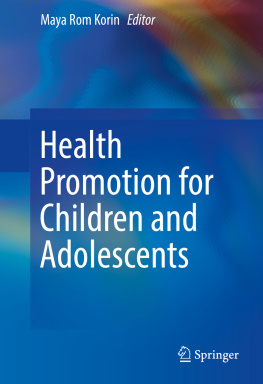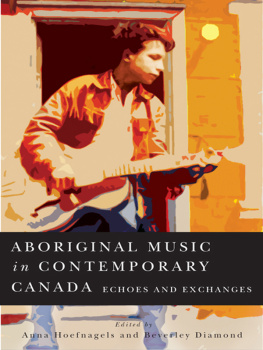
Introduction to Aboriginal Health
and Health Care in Canada
Vasiliki Douglas, PhD, MA, BA, BSN, is an instructor at the College of New Caledonia, Prince George, British Columbia, in the School of Health Sciences. Dr. Douglas holds a PhD in History of Nursing and Anthropology (University of Alberta, Edmonton, Alberta), a BA and MA in Ancient History/Classics (McGill University, Montreal, Quebec) and a BSN (University of British Columbia, Vancouver, British Columbia). She is a member of the International Network for Circumpolar Health Research. She was a Natural Sciences and Engineering Research Council of Canada (NSERC) ArcticNet Postdoctoral Fellow (UNBC/20092011); and has won multiple research grants to study and present on Indigenous Health Research (Canada and Norway). Dr. Douglas has publications focusing on Inuvialuit and Inuit traditional medical care: midwifery, food/cultural security, reconciling traditional knowledge, and climate change (International Journal of Circumpolar Health, Nursing Inquiry, Alaska Medicine). She is the principal investigator on a current research project: Food Security, Ice, Climate and Community Health: Climate Change Impact on Traditional Food Security in Canadian Inuit Communities. Dr. Douglas speaks three languages including French and Greek and has studied Latin and Inuktitut.

Introduction to Aboriginal Health
and Health Care in Canada
Bridging Health and Healing
Vasiliki Douglas, PhD, MA, BA, BSN

Copyright 2013 Springer Publishing Company, LLC
All rights reserved.
No part of this publication may be reproduced, stored in a retrieval system, or transmitted in any form or by any means, electronic, mechanical, photocopying, recording, or otherwise, without the prior permission of Springer Publishing Company, LLC, or authorization through payment of the appropriate fees to the Copyright Clearance Center, Inc., 222 Rosewood Drive, Danvers, MA 01923, 978750-8400, fax 978646-8600, .
Springer Publishing Company, LLC
11 West 42nd Street
New York, NY 10036
www.springerpub.com
Acquisitions Editor: Margaret Zuccarini
Production Editor: Michael OConnor
Composition: Newgen Imaging
ISBN: 978-0-8261-1797-7
e-book ISBN: 978-0-8261-1799-1
13 14 15 16 17 / 5 4 3 2 1
The author and the publisher of this Work have made every effort to use sources believed to be reliable to provide information that is accurate and compatible with the standards generally accepted at the time of publication. The author and publisher shall not be liable for any special, consequential, or exemplary damages resulting, in whole or in part, from the readers use of, or reliance on, the information contained in this book. The publisher has no responsibility for the persistence or accuracy of URLs for external or third-party Internet websites referred to in this publication and does not guarantee that any content on such websites is, or will remain, accurate or appropriate.
Library of Congress Cataloging-in-Publication Data
Douglas, Vasiliki Kravariotis.
Introduction to aboriginal health and health care in Canada : bridging health and healing / Vasiliki Douglas.
p. ; cm.
Includes bibliographical references and index.
ISBN 978-0-8261-1797-7 ISBN 978-0-8261-1799-1 (e-book)
I. Title.
[DNLM: 1. Minority HealthCanada. 2. Ethnic GroupsethnologyCanada. 3. Health Services, IndigenousCanada. 4. Minority GroupsCanada. 5. Transcultural NursingmethodsCanada. WA 300 DC2]
RA563.M56
362.108900971dc23
2013011533
Special discounts on bulk quantities of our books are available to corporations, professional associations, pharmaceutical companies, health care organizations, and other qualifying groups. If you are interested in a custom book, including chapters from more than one of our titles, we can provide that service as well.
For details, please contact:
Special Sales Department, Springer Publishing Company, LLC
11 West 42nd Street, 15th Floor, New York, NY 100368002
Phone: 877687-7476 or 212431-4370; Fax: 212941-7842
E-mail:
Printed in the United States of America by Bang Printing.

Contents

Preface
ORIGINS OF THIS TEXT
Pedagogical Gap
This book has its origins in my experience teaching Aboriginal health to nursing students. When I began I was aware that there was a large and rapidly growing body of research on Aboriginal health. I was, however, surprised to find that there was no textbook specifically written to introduce nursing students to this important field. The pedagogical gap this presented was one that I found hard to fill, and in conversation with others in the field, found that my experience was common among my fellow instructors.
There is broad agreement that nursing students need a dedicated textbook on Aboriginal health in Canada. As schools of nursing increasingly adopt the Canadian Nursing Associations recommendations to fully integrate Aboriginal health into their curricula, the lacuna left without such a text becomes only more obvious.
SUGGESTIONS BY STUDENTS
I have now taught Aboriginal Health to nursing students for half a decade and the structure of this book reflects both my experience teaching and the suggestions of many students for improvements in course structure and content. They have been my proofreaders and editors from well before this project was no more than a vague idea through its development into a reality. I am extremely grateful to them for their support and encouragement and the excellent feedback they offered when I ran many of the concepts I developed past them.
Personal Experiences of Aboriginal Health Issues and Perspectives on Health and Wellness
My doctoral research concerned the development of community midwifery programs in the Canadian Arctic. My fieldwork there, and the hospitality and assistance I experienced from Inuit, nurses, administrators and physicians, did much to nurture my interest in Canadian Aboriginal health. More importantly, my observations of how Inuit residents and midwives interacted with each other led me to develop the concept of epistemological accommodation, which is the theoretical core of this book.
PURPOSE OF THIS TEXT
Nursing Students and Instructors
This text is intended primarily to provide nursing students with an accessible guide to the health of Canadian First Nations, Mtis and Inuitthe Aboriginal peoples of Canada. Most nurses practising in Canada will encounter Aboriginal patients in the course of their careers, indeed for some the majority of their patients will be Aboriginal. It is important for these and future professionals to understand the range of cultural expression that comprises Aboriginal culture and society in Canada today. It is important to be mindful that some Aboriginal patients may participate in traditional culture, while some may not. However, most Aboriginal people in Canada do share certain cultural tropes that may differ from those of the general population, and it is important for health care professionals to be aware of these differences. Not only is it important for the professionals to be aware that they may exist for their patients but it is also important to understand that it is incumbent upon them to provide appropriate, culturally safe care without losing sight of their own professional standards.
Next page
